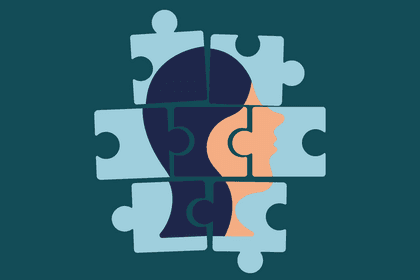
What drives positive change in mental health? These research teams want to find out
We’ve awarded more than £47 million to 12 research teams to investigate what makes interventions for anxiety, depression and psychosis effective.

A stakeholder workshop in New Delhi, India, from previous work that underpins Dr Daniel Michelson's new research investigating the mechanisms of action for problem solving and behavioural activation as early interventions for youth depression.
Shiv Ahuja
Millions of people around the world are affected by anxiety, depression and psychosis. While treatments for these conditions exist and can help some people, we still know too little about how they work.
That’s why in 2020 and 2021, we asked researchers to nominate and review the evidence for ‘active ingredients’ for preventing, treating or managing anxiety and depression. We defined active ingredients as the aspects of an intervention that drive clinical effect. In other words, the aspects that are most likely to make a difference in preventing or addressing mental health difficulties. The researchers reviewed over 40 active ingredients, including physical exercise, reducing repetitive negative thinking and taking antidepressants.
From this research, a clear gap emerged.
We learned that there was a need for greater research into how and why these active ingredients of effective interventions work.
Now, our new funding aims to address that gap.
How looking backwards can help research move forward
That means taking an existing effective intervention or approach and testing hypotheses using experimental methods to understand what makes it effective.
Each research project will involve the knowledge, insight and expertise of people with lived experience of mental health challenges to inform insights and interventions.
The goal is to inform the improvement of existing treatments and the development of new ones.
What we’re funding
Our new awardees will investigate the mechanisms underpinning a range of active ingredients, including problem solving, physical activity and mechanisms involved in antipsychotic drugs.
Learn more about the projects we’re supporting:
EM-BODY: Interoceptive mechanisms of emotion in mental health treatment
Professor Sarah Garfinkel, University College London, UK
Dr Camilla Nord, University of Cambridge, UK
Interoception is the perception of sensations from inside your body. It’s key to detecting, interpreting and regulating emotion. It’s also a common mechanism targeted in mental health treatments. Professor Garfinkel and Dr Nord will lead a team across the UK and Argentina to investigate the interoceptive mechanisms of emotion in mental health treatments. Experiments will take place across three stages, with lived experience experts consulted throughout – from conceptualisation to dissemination. The research could help identify people who might benefit from interoceptive targeting, how interoception can be increased in treatments – and ultimately, transform treatment options and outcomes for people living with anxiety and depression.
How does the SSRI fluoxetine work in adolescent depression?
Professor Catherine Harmer
University of Oxford, UK
While we know the selective serotonin reuptake inhibitor (SSRI) fluoxetine can be effective in treating young people with depression, we still don’t understand how SSRIs work. Symptoms, diagnosis and treatment response in depression are all affected by developmental differences. Professor Harmer’s research team will take a developmental and interdisciplinary approach to analyse how fluoxetine affects neurocognitive function in adolescents with depression. They will work with young advisors with lived experience to co-define measures. The resulting findings could help find more effective treatments for young people with depression.
Learning mechanisms of pharmacological treatments for depression (RELMED)
Professor Quentin Huys
University College London, UK
First-line antidepressants target the neuromodulators serotonin, dopamine and noradrenaline. We know a lot about the roles these neuromodulators play in reinforcement learning – the process of using our experience to improve the outcomes of future choices. But we don’t know the mechanisms through which antidepressants relieve depression. Professor Huys and his team hypothesise that different antidepressants work by altering different reinforcement learning processes in the brain. They plan to investigate the learning mechanisms of antidepressants through trials in which patients with depression receive an antidepressant which targets serotonin, an antidepressant which targets dopamine and noradrenaline, or a placebo.
Targeting sleep to improve anxiety and depression in young people
Professor Simon Kyle
University of Oxford, UK
Sleep and circadian rhythm disturbances play a role in the development and maintenance of multiple psychiatric disorders. Professor Kyle and his team hypothesise that these disturbances affect the neural mechanisms that underpin emotion regulation, contributing to symptoms of anxiety and depression. To test this, they will investigate how sleep restriction therapy, an effective treatment for insomnia, improves mental health in young people. Young adults will be recruited to take part in the research, since this is a time of life when anxiety and depression commonly manifest and when early intervention may be particularly helpful. Mental health lived experience experts will also be involved throughout and supported by Vocal, a not-for-profit organisation that specialises in public involvement in health research.
Certain about uncertainty: bridging cells and the clinic to uncover causal mechanisms of anxiety interventions
Dr Rebecca Lawson
University of Cambridge, UK
In uncertain situations, people rely on clues from the environment – things known to be predictable from past experience – to determine what will happen next. When we can’t predict what will happen next, anything could seem like a threat. Intolerance of uncertainty is increasingly recognised as a key risk factor in anxiety and other mental health conditions. Dr Lawson and her team will use computerised tasks to capture an individual’s ‘uncertainty fingerprint’ – a measure of how people process different kinds of uncertainty in different cognitive contexts. They will test whether medication and cognitive behavioural therapy work by improving tolerance of uncertainty.
Understanding the causal mechanisms of antidepressant exposure and response
Professor Cathryn Lewis
King’s College London, UK
Why do people respond differently to antidepressants? Professor Lewis and her team will use genomic approaches to advance our understanding of the mechanisms of action and response in antidepressants. The team will use recent advances in causal inference, electronic health data and genomic datasets to deliver data on how antidepressants may be working. The research will involve people with lived experience whose expertise will help ensure the data insights are relevant and impactful. The new methods and datasets generated will help researchers better understand how antidepressants work and why responses vary in individuals.
Mechanistic trial of problem solving and behavioural activation for youth depression
Dr Daniel Michelson
King’s College London, UK
Behavioural activation and problem solving are two commonly used ‘active ingredients’ of effective mental health interventions. Both ingredients have the potential to be used as brief standalone interventions, yet they are rarely evaluated outside of multi-component interventions, such as cognitive behavioural therapy. Dr Michelson and his team will investigate the mechanisms of action underpinning problem solving and behavioural activation as early interventions for youth depression in a mechanistic trial involving university students in Delhi, India. Young people with lived experience of mental health challenges will also be involved in the pre-trial work – helping to co-adapt existing evidence-based protocols for problem solving and behavioural activation – and in the delivery of the interventions.
The mechanisms underlying the antidepressant effects of physical activity
Professor Jonathan Roiser
University College London, UK
Physical activity has been found to be an effective treatment for depression. But how it improves symptoms, and the underlying psychological and brain processes, remains unclear. Professor Roiser and his team will research the mechanisms of physical activity that improve symptoms of depression. Specifically, they want to investigate if physical activity boosts reward processing by reducing inflammation, increasing dopamine transmission and regulating regions of the brain that process reward. Through an eight-week trial involving 250 participants with depression, they will assess changes in brain systems that process reward and effort. Identifying these mechanisms could help improve and inform new treatments for people with depression.
Immune mechanisms of antipsychotic treatment response
Dr Katharina Schmack
The Francis Crick Institute, UK and University College London, UK
Antipsychotic drugs are the first-line treatment for early psychosis. While they are effective in reducing psychotic symptoms, they can have severe side effects. Understanding the mechanisms that underlie the therapeutic effects of antipsychotics could help to advance interventions for early psychosis. Emerging evidence suggests that immune responses targeting the brain may cause psychosis and that antipsychotic drugs regulate this immune imbalance. That’s what Dr Schmack and her research team aim to investigate. The project team will carry out this work through investigations of blood and cerebrospinal fluid from people with psychosis and investigations in mouse models.
Lithium's mechanism in bipolar disorder: investigating the light hypersensitivity hypothesis
Professor Daniel Smith
University of Edinburgh, UK
Lithium has been the most effective treatment for bipolar disorder for 70 years, but the precise mechanism of action is uncertain. Recent evidence suggests lithium may act on the retina to stabilise irregular circadian rhythms of mood, rest and activity, and cognition. Additionally, people with bipolar disorder who are hypersensitive to the destabilising effects of excess light in the evening may respond to lithium because it could make them less vulnerable to light-induced circadian disruption. Professor Smith and his team will test this hypothesis involving people with lived experience of bipolar disorder in every stage of the project, from design to dissemination.
Surprises as a mechanism of improvement in the psychological therapy of anxiety and depression in young people
Professor Argyris Stringaris
University College London, UK
Social anxiety and depression are common in young people. Symptoms of these conditions have been shown to improve with cognitive therapy for social anxiety. Professor Stringaris and his team will investigate what behavioural, neural and computational mechanisms underlie this improvement and how the benefits can be maximised for everyone individually. They will test whether cognitive therapy relies on positive surprises during social interactions, such that the outcome experienced is better than what is expected. For example, feeling anxious about going to a house party but then enjoying it once there. The team will collaborate with young people to understand whether the mechanisms of the intervention and their use for treatment are meaningful and ethically acceptable.
Understanding the mechanisms driving the reduction of repetitive negative thought
Professor Edward Watkins
University of Exeter, UK
Although cognitive-behavioural therapy (CBT) targeting repetitive negative thinking is effective, the mechanisms underpinning treatment effects are unknown. Professor Watkins and his team of researchers aim to address this. The team will test hypothesised mechanisms – such as replacing self-criticism with self-compassion or improving present-moment focus – through the innovative use of a large-scale factorial trial. They’ll work with people with lived experience of repetitive negative thinking to help shape the research questions and design. This research could lead to more effective, economical and accessible treatments for repetitive negative thinking available via an online platform to transform early intervention for depression and anxiety.
The future of mental health treatments
The research we’re funding as part of this call supports our vision to create transformative change in mental health. By investing in mental health science, our goal is to further research in this field and develop new and improved early interventions for anxiety, depression and psychosis for people around the world.
“It has been very exciting to see how the research community has responded to this call aimed at improving our understanding of how mental health interventions work,” says Dr Catherine Sebastian, Head of Evidence for Mental Health at Wellcome.
“The funded projects are highly ambitious, taking an interdisciplinary approach to help us better understand how biological, psychological and social mechanisms interact to improve symptoms across a range of different interventions. It is particularly encouraging that every project has been developed in collaboration with people with lived experience of anxiety, depression and/or psychosis.”
Professor Miranda Wolpert, Director of Mental Health at Wellcome, adds: “Our hope is that the findings will point the way to refining existing interventions and to developing new ones in ways that best reflect the priorities of those experiencing mental health challenges.”

